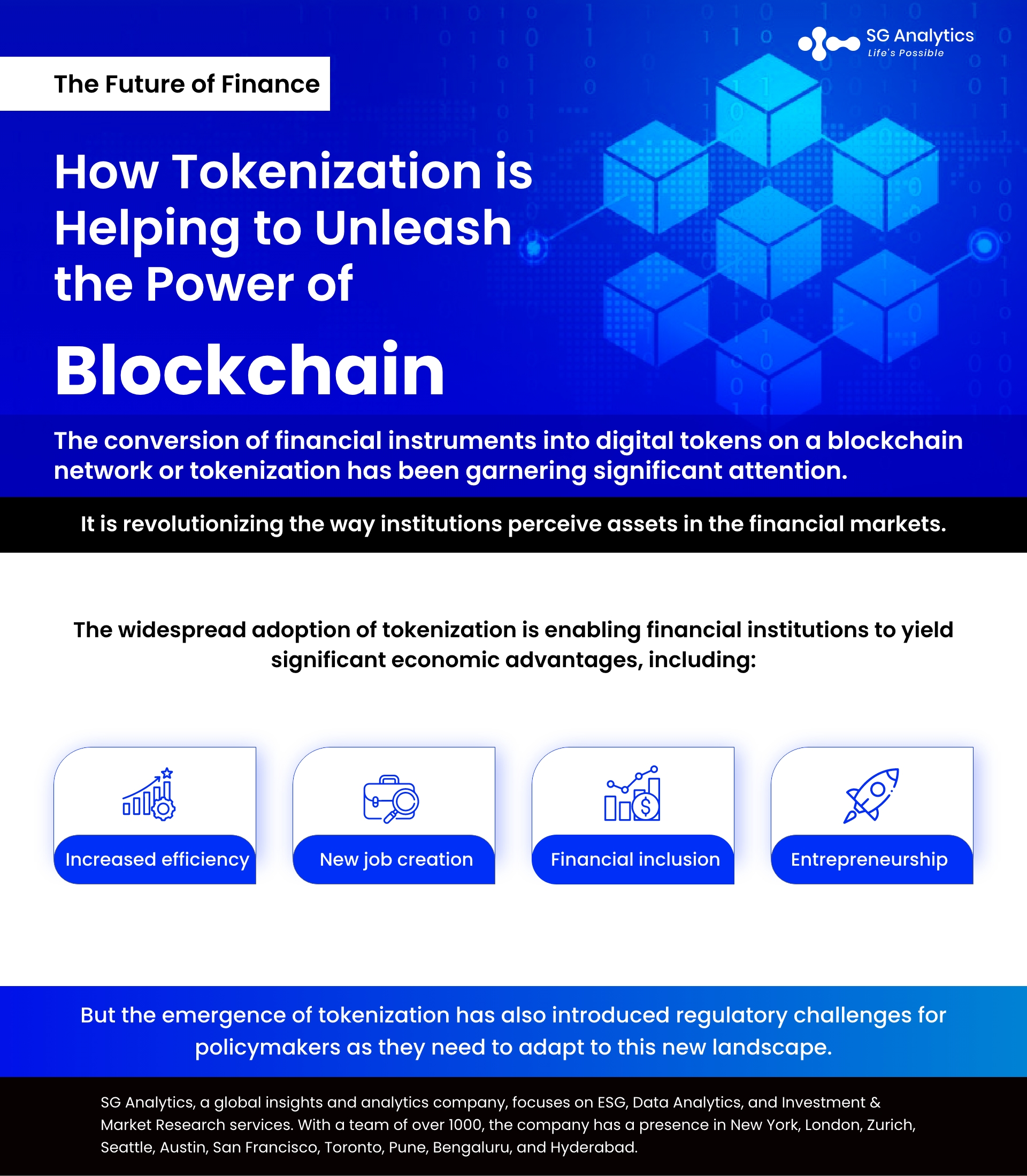The conversion of financial instruments into digital tokens on a blockchain network or tokenization has been garnering significant attention. With blockchain technology operating as the foundation for this groundbreaking concept, it is enabling financial institutions with a decentralized platform to create, exchange, and trade digital tokens.
Today tokenization is continuing to gain traction and becoming an integral component for investors and regulators. To adapt to this emerging trend, financial institutions are embracing the potential of tokenization and functioning collaboratively to address the challenges that follow.
Tokenization enables them to unlock new economic opportunities as well as drive sustainable growth in the global economy. The future of the finance industry lies in the integration of tokenization and blockchain, and institutions that are preparing themselves to navigate this new landscape will stand at the forefront of this financial revolution.
The convergence of blockchain technology across financial markets is highlighting the significance of tokenization and its impact on the economy. Tokenization holds the possibility to transform financial markets and investment opportunities, thus revolutionizing the global economy.

Read more: How are Technological Advancements helping to Reshape Global Economic Growth?
The Pillar of Tokenization: Blockchain
Blockchain technology offers institutions a secure and transparent framework for tokenization. By incorporating a decentralized ledger, blockchain networks provide the creation and management of digital tokens symbolizing financial assets. These tokens can further be traded, exchanged, or utilized across different transactions without the need for intermediaries.
The tokenization of blockchain technology presents the following benefits:
-
Security: The decentralized nature of blockchain networks enables an easy and secure exchange of information, thereby mitigating the risk of fraud.
-
Cost Efficiency: Tokenization helps eliminate intermediaries, thus decreasing transaction costs and expediting settlement times.
-
Transparency: Blockchain technology facilitates real-time tracking and auditing of transactions, thus facilitating trust among participants and reducing the risk of disputes.
-
Accessibility: Tokenization authorizes financial institutions with fractional ownership, allowing investors to engage in asset classes that were previously limited to high-net-worth institutional investors.

The global financial markets are waking up to blockchain technology. Even amid the turmoil set off by inflation, interest hikes, and quantitative tightening, the global financial market is yet off the radar for retail investors. This transition toward on-chain assets is being considered a big leap in the bond markets—and capital markets, in general. Issuance of assets on-chain significantly reduces the settlement time. But the situation appears to be changing as they are slowly earmarking 2023 to integrate blockchain technology across operations.
Read more: Future Of Tokenization: A Comprehensive Look at Tokenization and its Impact
The Future of Finance: Blockchain
The changing economic landscape is putting financial institutions on a path that is moving fast, enabling them to decisively take the lead in shaping cutting-edge technologies. Global economies are exploring and leveraging new avenues like DeFi, as well as adopting technologies to fortify existing financial plumbing.
The distributed ledger technology found significant prominence as the backbone of Bitcoin, the pioneering cryptocurrency. The technology offers several key attributes, making it uniquely suited to enable direct interaction between business trading parties. Blockchain holds the potential as a groundbreaking technology for business, equipping businesses with the capability to slice through layers of inefficiency, and is gaining momentum.
The characteristics include the following:
-
Cryptographic security empowers institutions to write or read any private blockchain requirements. This further leads the user to where the data is stored, permitting access to digital assets.
-
Blockchains offer both a public and permission incarnation. But on a private blockchain, they can be used for financial applications, enabling companies must be invited to participate.

-
Blockchain’s built-in redundancy across decentralized structures across the network harbors a copy of the database.
-
In addition to having the correct credentials, process integrity enables users to update the blockchain once a consensus of participants has validated the data.
Business blockchains are now operating as standalone solutions as they realize the increasing significance combined with other technologies like automation or artificial intelligence. With the financial landscape evolving and increasingly automated and digitized, blockchain is taking center stage, and financial institutions are understanding the increase in strategic importance.
The fueling interest and growing awareness of the value blockchain are driving financial firms to integrate operational processes like supply chain, customer operations, and service with finance processes. In addition, it is further driving significant efficiencies and cycle-time reductions. Blockchain offers full end-to-end transparency across operations and finance, facilitating predictive operational insights and opportunities to optimize capital.
Read more: The Changing Fintech Landscape: Top Trends for 2023 and Beyond
Influence of Tokenization in the Financial Markets
Tokenization of assets like bonds and securities, along with designing a smart contract, assists institutions in executing their issuance, sale, and market functions. Tokenization implies creating a representation of the real-world asset on a blockchain in the form of a virtual token.

Tokenization is further paving the way for the fractionalization of the instrument, making the market accessible to investors. This is proving beneficial as it fosters greater participation and strengthens the integrity of the market while also supporting healthy investing habits.
Tokenization is reshaping the financial markets by creating new, accessible, and tradable financial assets. This has resulted in several substantial shifts in the financial landscape. They are as follows:
-
Democratization of New Opportunities: Tokenization is facilitating financial institutions with fractional ownership, enabling investors to buy as well as sell portions of assets, including real estate, art, or private equity. It is further presenting new investment opportunities for a broader audience, thereby facilitating financial inclusion and wealth generation.
-
Improved Market Liquidity: Tokenization is leading to the release of liquidity in previously illiquid asset classes. This assists institutions with more efficient trading and price discovery, leading to reduced transaction costs and enhanced market efficiency.
-
The Emergence of New Markets: Tokenization is facilitating the establishment of new markets and investment opportunities. Tokenized assets help to aggregate into diverse portfolios and investment products with unique risk-return profiles.
-
Regulatory Challenges: With tokenization becoming popular, regulators are facing the task of adapting existing frameworks to accommodate this new form of financial assets. This results in financial institutions integrating new regulations with existing ones.

Implications of Tokenization in the Financial Markets
The widespread adoption of tokenization is enabling financial institutions to yield significant economic advantages. They are as follows:
-
Increased Efficiency: Tokenization holds the potential to boost overall economic efficiency for the industry by lowering transaction costs as well as streamlining asset management, and improving market liquidity.
-
New Job Creation: The expansion of tokenization is leading to generating jobs across different sectors, such as technology, finance, and legal services.
-
Financial Inclusion: By democratizing access across new investment opportunities, tokenization is also contributing to enhanced financial inclusion and wealth distribution, thereby leading financial institutions on the path of economic stability and growth.
-
Entrepreneurship: Tokenization is assisting with capital raising for startups and small businesses, thus fostering an environment for innovation and entrepreneurship.

Final Thoughts
Tokenization is revolutionizing the way institutions perceive assets in the financial markets. By integrating blockchain technology, financial institutions are capitalizing on security, transparency, and efficiency. Tokenization is also enabling them, providing them the potential to transform and democratize investment opportunities.
The economic impact of tokenization is far-reaching. It has the potential not only to bolster economic efficiency but also to create new jobs, promote financial inclusion, and foster innovation. But the emergence of tokenization has also introduced regulatory challenges for policymakers as they need to adapt to this new landscape while ensuring sufficient regulations are in place for investors and the economy.
With a presence in New York, San Francisco, Austin, Seattle, Toronto, London, Zurich, Pune, Bengaluru, and Hyderabad, SG Analytics, a pioneer in Research and Analytics, offers tailor-made services to enterprises worldwide.
A leader in Market research, SG Analytics enables organizations to achieve actionable insights into products, technology, customers, competition, and the marketplace to make insight-driven decisions. Contact us today if you are an enterprise looking to make critical data-driven decisions to prompt accelerated growth and breakthrough performance.









